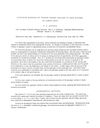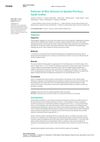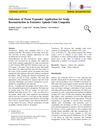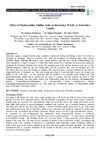 April 2023 in “Journal of Investigative Dermatology”
April 2023 in “Journal of Investigative Dermatology” LSD1 is essential for healthy skin development and creating the skin's protective barrier.
 February 1956 in “Bulletin of Experimental Biology and Medicine”
February 1956 in “Bulletin of Experimental Biology and Medicine” Glycogen levels in mouse skin drop after injury but increase during healing, returning to normal within a month.
 13 citations,
January 2014 in “Journal of Investigative Dermatology”
13 citations,
January 2014 in “Journal of Investigative Dermatology” The laser comb did not improve hair regrowth in mice with alopecia areata.
 January 2020 in “Veterinary world/Veterinary World”
January 2020 in “Veterinary world/Veterinary World” The natural topical treatment improved rabbits' skin and hair condition.
13 citations,
January 2001 in “Skin pharmacology and physiology” Micro-Imager® helps see how drugs spread in human skin.
 43 citations,
December 2008 in “Molecular biology of the cell”
43 citations,
December 2008 in “Molecular biology of the cell” Disrupting Smad4 in mouse skin causes early hair follicle stem cell activity that leads to their eventual depletion.
21 citations,
April 2019 in “Journal of cosmetic and laser therapy” Laser hair removal is popular for long-term hair reduction but carries risks, requiring well-trained operators and better regulations, especially in South Africa.
 December 2023 in “Curēus”
December 2023 in “Curēus” Acne is the most common skin issue in Qassim Province, especially among young adults.
 52 citations,
December 2000 in “Archives of Dermatological Research”
52 citations,
December 2000 in “Archives of Dermatological Research” Scalp skin barrier affects hair loss; personalized treatments needed.
 April 2023 in “Journal of Investigative Dermatology”
April 2023 in “Journal of Investigative Dermatology” Combining platelet-rich plasma with laser therapy improves treatment for vitiligo, skin rejuvenation, and acne scars, but more research is needed.
 8 citations,
April 2019 in “ACS Biomaterials Science & Engineering”
8 citations,
April 2019 in “ACS Biomaterials Science & Engineering” The new SIS-PEG sponge is a promising material for skin regeneration and hair growth.
 25 citations,
November 2014 in “Ageing Research Reviews”
25 citations,
November 2014 in “Ageing Research Reviews” Skin aging is caused by stem cell damage and can potentially be delayed with treatments like antioxidants and stem cell therapy.
 36 citations,
January 2006 in “Veterinary Dermatology”
36 citations,
January 2006 in “Veterinary Dermatology” Cyclosporin effectively and safely treated skin diseases in three pets with no side effects.
 4 citations,
October 2012 in “Expert Review of Dermatology”
4 citations,
October 2012 in “Expert Review of Dermatology” Dermoscopy greatly improves melanoma diagnosis and reduces unneeded surgeries.
35 citations,
October 2005 in “European journal of pharmaceutics and biopharmaceutics” Polymers increased skin permeation and stability of steroid hormones in liposomal formulations.
 January 2021 in “International journal of medical science and health research”
January 2021 in “International journal of medical science and health research” A patient with sickle cell trait and low vitamin D might have lupus, a rare combination that needs more attention.
1 citations,
February 2022 in “Journal of the American Academy of Dermatology” Taking biotin supplements can be risky and often lacks evidence of effectiveness for skin, hair, and nail issues.
55 citations,
January 2020 in “Advances in experimental medicine and biology” Vitamin D and its receptor may help prevent skin cancer.
12 citations,
May 2021 in “The journal of investigative dermatology/Journal of investigative dermatology” Laminin 332 is essential for normal skin cell behavior and structure.
17 citations,
February 2001 in “Journal of the American Academy of Dermatology” Lithium can cause skin changes similar to mycosis fungoides.
 113 citations,
December 2000 in “The journal of investigative dermatology. Symposium proceedings/The Journal of investigative dermatology symposium proceedings”
113 citations,
December 2000 in “The journal of investigative dermatology. Symposium proceedings/The Journal of investigative dermatology symposium proceedings” KGF and activin are crucial for skin healing and repair.
18 citations,
February 2005 in “Facial plastic surgery” New cosmetic procedures effectively rejuvenate the lower face with minimal recovery time.
7 citations,
September 2021 in “Antimicrobial Agents and Chemotherapy” Olorofim effectively treats fungal skin infections.
1 citations,
January 2022 in “Clinical Cases in Dermatology” A rare scalp condition was successfully treated with specific medications after 9 months.
5 citations,
June 2016 in “JAMA Dermatology” People with hair loss should use strong sun protection to prevent scalp skin cancer.
 58 citations,
November 2013 in “Journal of Innovative Optical Health Sciences”
58 citations,
November 2013 in “Journal of Innovative Optical Health Sciences” Multiphoton microscopy is a promising tool for detailed skin imaging and could improve patient care if its challenges are addressed.
 4 citations,
November 2015 in “Aesthetic Plastic Surgery”
4 citations,
November 2015 in “Aesthetic Plastic Surgery” Using tissue expanders for scalp reconstruction in patients with extensive Aplasia Cutis Congenita is effective and has minimal complications.
 2 citations,
March 2014 in “Dermatologic Clinics”
2 citations,
March 2014 in “Dermatologic Clinics” The editor suggests removing "race" and "ethnicity" from dermatology and creating tools to objectively assess skin color and hair texture.
 153 citations,
October 2012 in “Skin Pharmacology and Physiology”
153 citations,
October 2012 in “Skin Pharmacology and Physiology” Caffeine in cosmetics may reduce cellulite, protect skin, and stimulate hair growth, but more research is needed on its use and effects.
 July 2017 in “International journal of Ayurvedic and herbal medicine”
July 2017 in “International journal of Ayurvedic and herbal medicine” Madayantika Siddha Taila is effective for treating Seborrhea capitis.



















